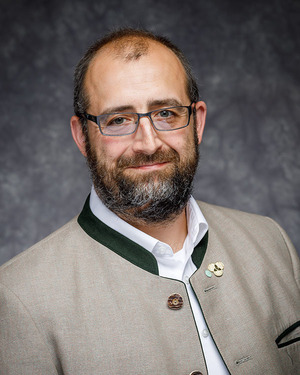
- Marquette University
- Professor of Historical Theology
- Affiliation During NDIAS Fellowship: Marquette University
- Pampusch Scholar, Residential Fellow (2010-2011)
- “The Theological Debates of the Catholic Enlightenment in Central Europe”
- Director's Fellow (2018-2019)
- "Catholic Reform Revisited"
Ulrich L. Lehner is Professor of Historical Theology at Marquette University. He specializes in religious history of the Early Modern period, the Enlightenment, and the 19th century.
Among Professor Lehner’s many publications are nine books, including Enlightened Monks (Oxford UP: 2010) [Gilmary Shea Book Award], The Catholic Enlightenment (Oxford UP: 2016), and God Is Not Nice (Ave Maria Press: 2017), as well as numerous articles, reviews, and sixteen edited volumes, including The Oxford Handbook of Early Modern Theology, 1600-1800 (Oxford UP: 2016) and Women, Enlightenment, and Catholicism: A Transnational Biographical History (Routledge: 2018). Forthcoming in 2019 is the edited volume Studies in Philosophical Epistemology-Festschrift for H. Schondorf SJ (Kohlhammer: 2019) as well as The Salamancan Carmelites on the Motive of the Incarnation, the first volume of his new book series Early Modern Catholic Sources with the Catholic University of America Press. Since 2014 he is a member of the European Academy of Sciences and Arts.
In 2008, Professor Lehner was selected as a Member and Herodotus Fellow in the School of Historical Studies at the Princeton Institute for Advanced Study, and he was also selected as a fellow at the Institute for Comparative History of Religious Orders at the University of Eichstätt in Germany. In Fall 2010, he served as a Distinguished Fellow at the NDIAS and was also named a Pampusch Scholar. In 2011-2012, he was selected for the Andrew Mellon Research Group “Religion across the Disciplines” at the University of Notre Dame. From 2014 to 2017 he was a fellow of the Humboldt and Friedrich von Siemens Foundation in Munich after previously been selected twice as Earhart Research Fellow.
Publications
-
A Companion to the Catholic Enlightenment in Europe
Brill, 2010
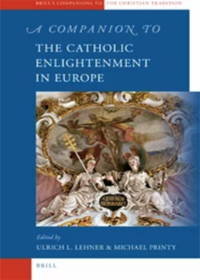
This book offers the first comprehensive overview of the Catholic Enlightenment in Europe. It surveys the diversity of views about the structure and nature of the movement, pointing toward the possibilities for further research. The volume presents a series of comprehensive treatments on the process and interpretation of Catholic Enlightenment in France, Spain, Portugal, Poland, the Holy Roman Empire, Malta, Italy and the Habsburg territories. An introductory overview explores the varied meanings of Catholic Enlightenment and situates them in a series of intellectual and social contexts. The topics covered in this book are crucial for a proper understanding of the role and place not only of Catholicism in the eighteenth century, but also for the social and religious history of modern Europe.
-
Enlightened Monks: The German Benedictines, 1740-1803
Oxford University Press, 2011
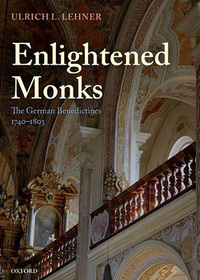
Enlightened Monks investigates the social, cultural, philosophical, and theological challenges the German Benedictines had to face between 1740 and 1803, and how the Enlightenment process influenced the self-understanding and lifestyle of these religious communities. It had an impact on their forms of communication, their transfer of knowledge, their relationships to worldly authorities and to the academic world, and also their theology and philosophy. The multifaceted achievements of enlightened monks, which included a strong belief in individual freedom, tolerance, human rights, and non-violence, show that monasticism was on the way to becoming fully integrated into the Enlightenment. Ulrich L. Lehner refutes the widespread assumption that monks were reactionary enemies of Enlightenment ideas. On the contrary, he demonstrates that many Benedictines implemented the new ideas of the time into their own systems of thought. This revisionist account contributes to a better understanding not only of monastic culture in Central Europe, but also of Catholic religious culture in general.
-
Enlightenment and Catholicism in Europe: A Transnational History
Notre Dame Press, 2014
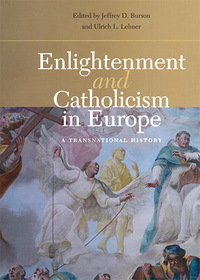
In recent years, historians have rediscovered the religious dimensions of the Enlightenment. This volume offers a thorough reappraisal of the so-called “Catholic Enlightenment” as a transnational Enlightenment movement. This Catholic Enlightenment was at once ultramontane and conciliarist, sometimes moderate but often surprisingly radical, with participants active throughout Europe in universities, seminaries, salons, and the periodical press.
In Enlightenment and Catholicism in Europe: A Transnational History, the contributors, primarily European scholars, provide intellectual biographies of twenty Catholic Enlightenment figures across eighteenth-century Europe, many of them little known in English-language scholarship on the Enlightenment and pre-revolutionary eras. These figures represent not only familiar French intellectuals of the Catholic Enlightenment but also Iberian, Italian, English, Polish, and German thinkers. The essays focus on the intellectual and cultural factors influencing the lives and works of their subjects, revealing the often global networks of intellectual sociability and reading that united them both to the Catholic Enlightenment and to eighteenth-century policies and projects. The volume, whose purpose is to advance the understanding of a transnational “Catholic Enlightenment,” will be a reliable reference for historians, theologians, and scholars working in religious studies.
-
The Catholic Enlightenment: The Forgotten History of a Global Movement
Oxford University Press, 2016
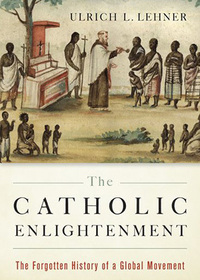
“Whoever needs an act of faith to elucidate an event that can be explained by reason is a fool, and unworthy of reasonable thought.” This line, spoken by the notorious 18th-century libertine Giacomo Casanova, illustrates a deeply entrenched perception of religion, as prevalent today as it was hundreds of years ago. It is the sentiment behind the narrative that Catholic beliefs were incompatible with the Enlightenment ideals. Catholics, many claim, are superstitious and traditional, opposed to democracy and gender equality, and hostile to science. It may come as a surprise, then, to learn that Casanova himself was a Catholic. In The Catholic Enlightenment, Ulrich L. Lehner points to such figures as representatives of a long-overlooked thread of a reform-minded Catholicism, which engaged Enlightenment ideals with as much fervor and intellectual gravity as anyone. Their story opens new pathways for understanding how faith and modernity can interact in our own time.
Lehner begins two hundred years before the Enlightenment, when the Protestant Reformation destroyed the hegemony Catholicism had enjoyed for centuries. During this time the Catholic Church instituted several reforms, such as better education for pastors, more liberal ideas about the roles of women, and an emphasis on human freedom as a critical feature of theology. These actions formed the foundation of the Enlightenment’s belief in individual freedom. While giants like Spinoza, Locke, and Voltaire became some of the most influential voices of the time, Catholic Enlighteners were right alongside them. They denounced fanaticism, superstition, and prejudice as irreconcilable with the Enlightenment agenda.
In 1789, the French Revolution dealt a devastating blow to their cause, disillusioning many Catholics against the idea of modernization. Popes accumulated ever more power and the Catholic Enlightenment was snuffed out. It was not until the Second Vatican Council in 1962 that questions of Catholicism’s compatibility with modernity would be broached again.
Ulrich L. Lehner tells, for the first time, the forgotten story of these reform-minded Catholics. As Pope Francis pushes the boundaries of Catholicism even further, and Catholics once again grapple with these questions, this book will prove to be required reading.
-
Women, Enlightenment and Catholicism: A Transnational Biographical History
Routledge, 2017
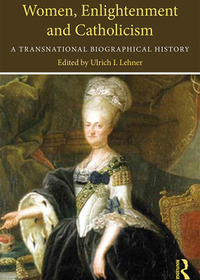
Women, Enlightenment and Catholicism explores, for the first time, the uncharted territory of women’s religious Enlightenment. Each chapter offers a biographical insight into the social and cultural context of female Enlighteners and how Catholic women in Europe used the thought and values of Enlightenment to articulate their beliefs about how to live their faith in the world.
The collection of portraits within this book offers a closer look into the new understanding of womanhood that emerged from Enlightenment culture and was conceived independently from marital relationships. They also highlight the distinctive contributions that women made to political and religious philosophy, spirituality and mysticism, and the efforts to bring scientific knowledge to the attention of other women.
Guiding readers through the complex religious, intellectual and global connections influenced by the Enlightenment, Women, Enlightenment and Catholicism brings the achievements of Enlightenment women to the foreground and restores them to their rightful place in intellectual history. It is ideal reading for scholars and students of Enlightenment history, early modern religion and early modern women’s history.